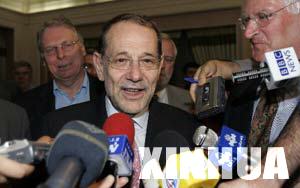
EU foreign policy chief Javier Solana speaks to journalists at Mehrabad
Airport in Tehran June 5, 2006. (Xinhua photo)
European Union foreign policy chief Javier Solana arrived in Tehran last
night to present Iran a six-nation proposal over Iran's disputed nuclear issue.
"We want to start a fresh relationship with Iran on the basis of mutual
respect and mutual trust, the new proposal could let us be engaged in
negotiations based on trust, confidence and respect," Solana told reporters at
Tehran's Mehrabad International Airport.
Voicing hope of a "new relationship" with Iran, Solana said that "we want to
restart a fresh relationship and we want to do it based on what I said before,
based on a spirit of trust and respect and confidence."
"The proposal we bring along will allow us to get engaged in negotiations
based on trust, confidence and respect," he stressed. The five permanent members
of the UN Security Council plus Germany agreed a new package over Iran's
disputed nuclear issues last Thursday.
The two-part package contains economic and political incentives, including
talks with the United States, to encourage Tehran to abandon uranium enrichment.
It also implicates a threat of UN sanctions if Iran doesn't comply.
Iran has repeatedly claimed that it would never suspend the uranium
enrichment activities.
A few hours before Solana's arrival, Iran's Foreign Minister Manouchehr
Mottaki said at the airport that his country would examine the new proposal and
then give a formal response to the six world powers.
"If they can consider Iran's legal nuclear demands and don't politicize the
issue, I think we could have an reasonable agreement with them," said Mottaki.
Meanwhile, Mottaki disclosed that Solana would meet Iran's top nuclear
negotiator Ali Larijani on Tuesday. Solana may also meet with Iran's flinty
President Mahmoud Ahmadinejad.
The United States and European countries claim that Iran is using its
civilian nuclear program as a cover to produce nuclear weapons.
Tehran has repeatedly denied the charge, saying its nuclear program is merely
to generate electricity, not bombs. Iran has repeatedly said that it will not
give up its right under the nuclear Non-Proliferation Treaty to enrich uranium
and produce nuclear fuel for power plant.



